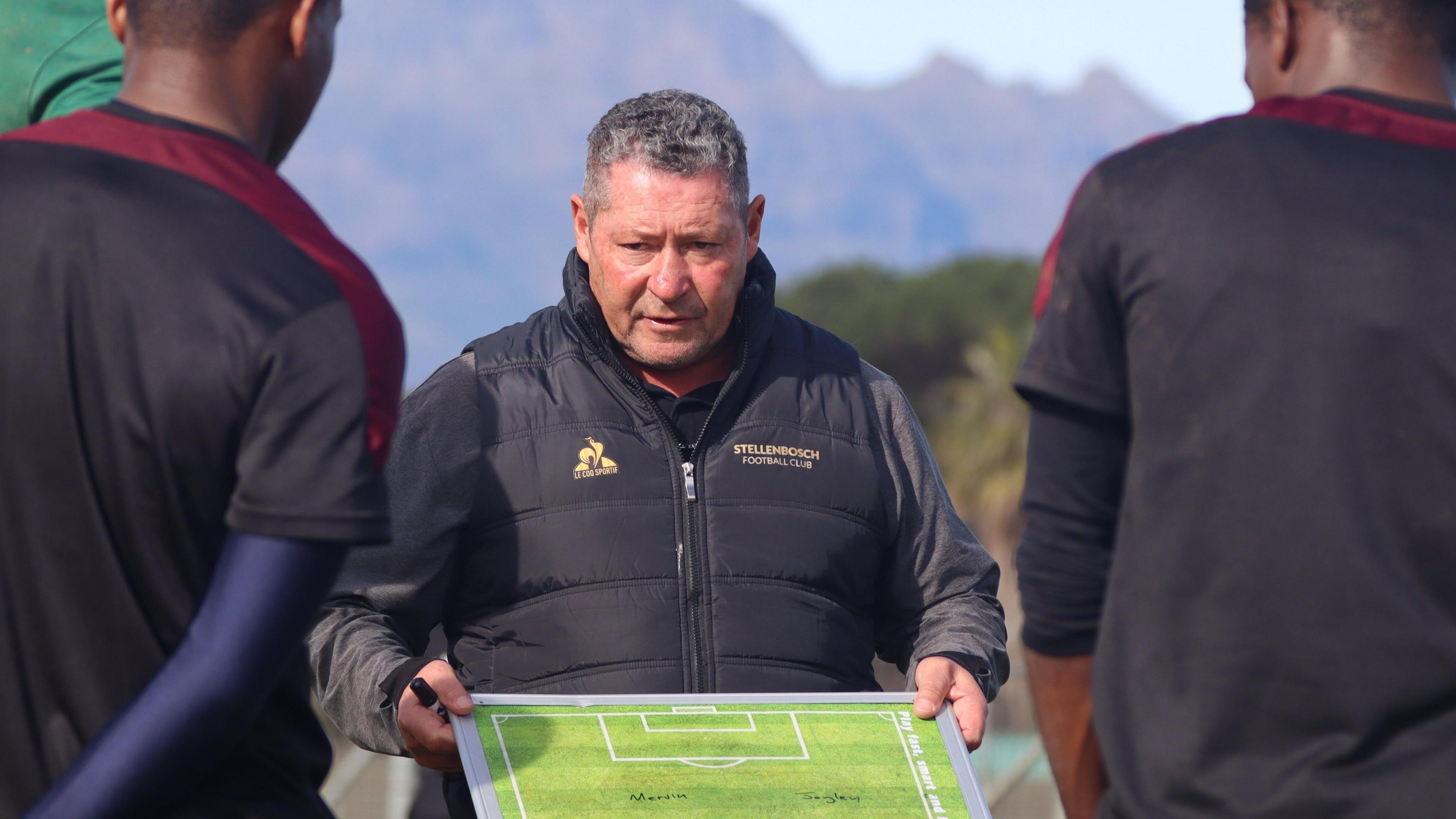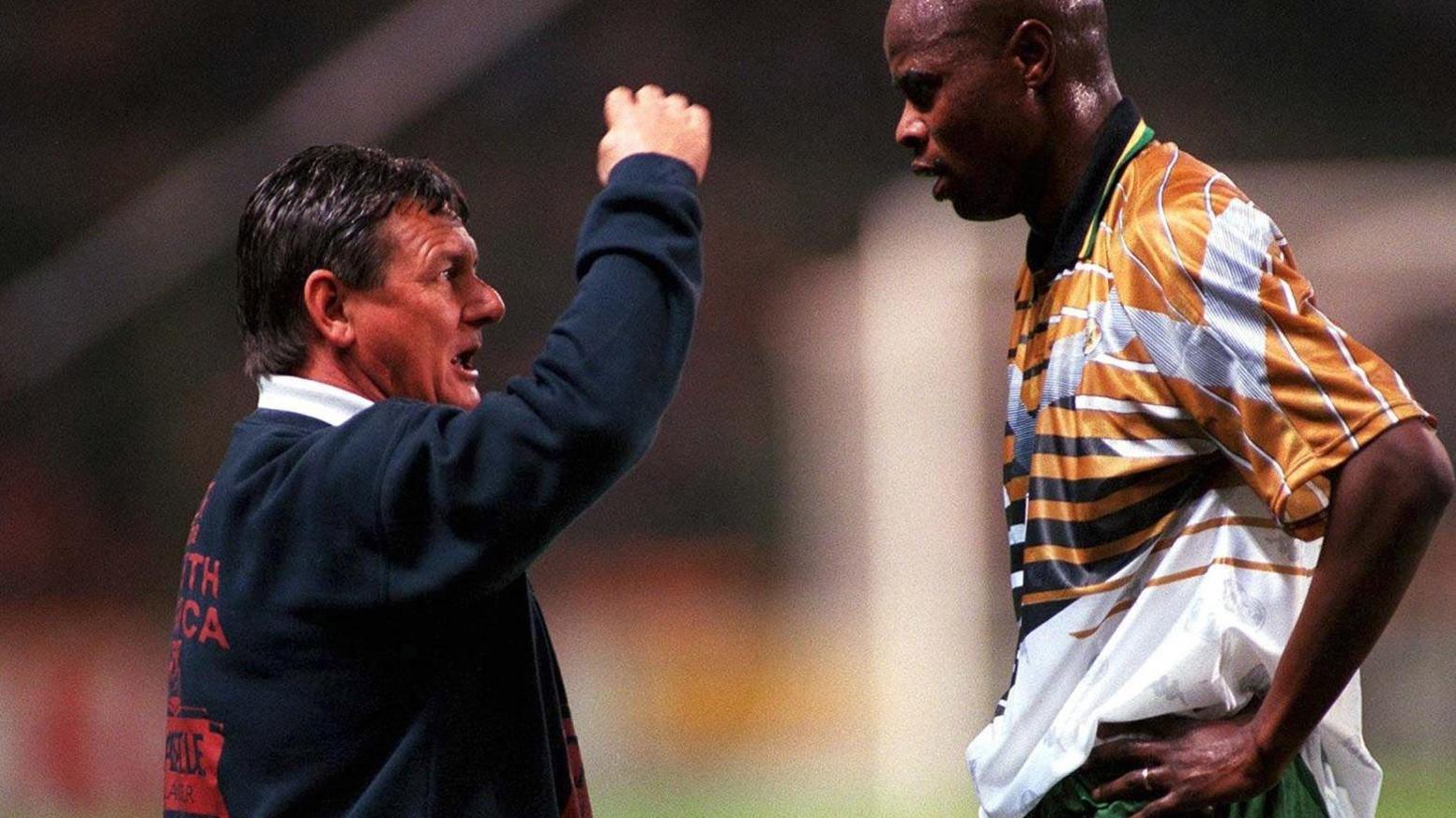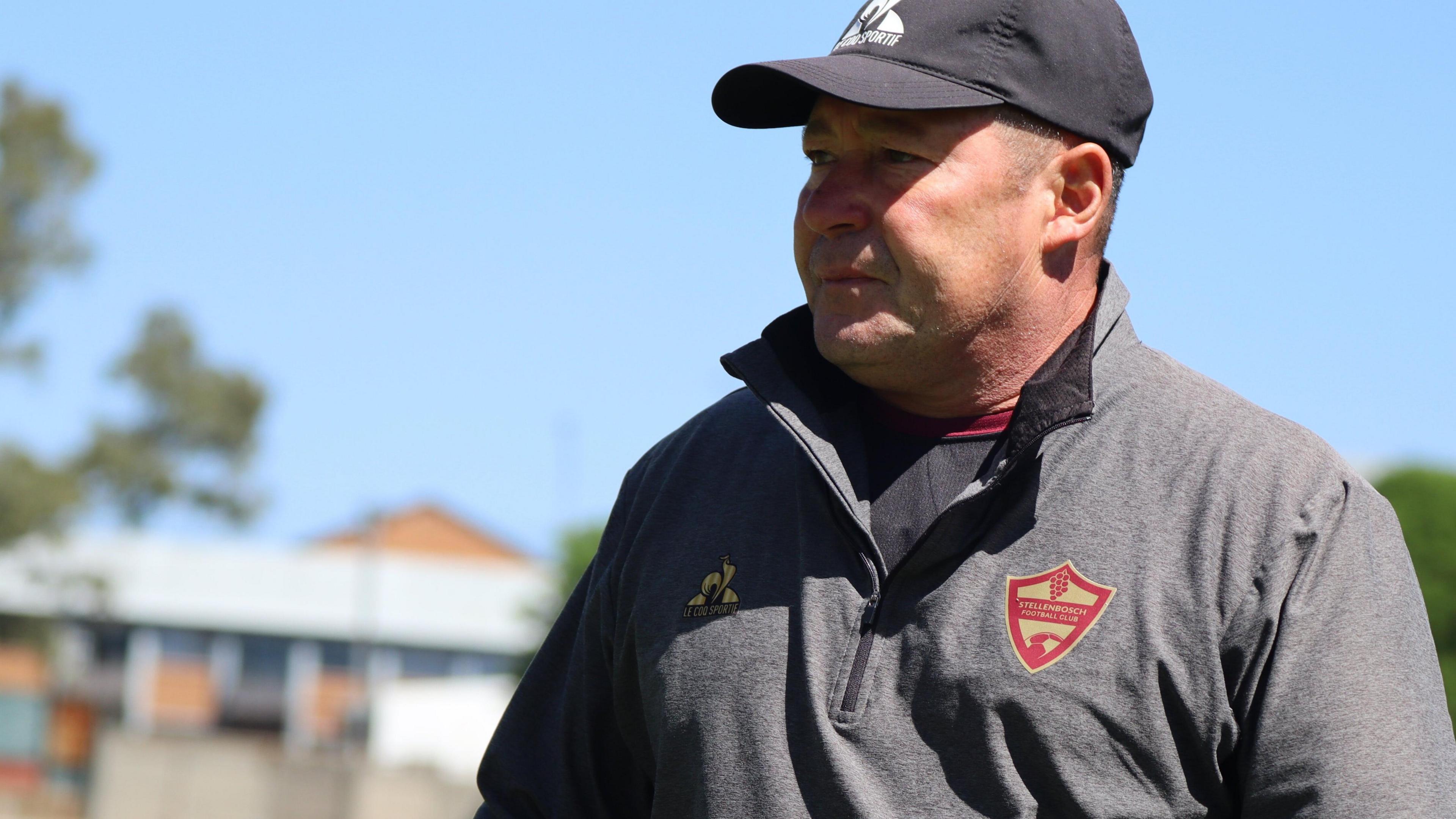Stellenbosch set for African adventure with Barker

Stellenbosch FC boss Steve Barker is the longest-serving coach in the South African top flight
- Published
While Mamelodi Sundowns sailed to a seventh consecutive South African league title, Stellenbosch are on a long-term mission to disrupt the country's football hierarchy.
Situated in a town 50km to the east of Cape Town that has historically been known as a hotbed of rugby talent, the club managed by Steve Barker won their maiden major trophy this season and will make their debut in continental competition after their third-placed finish in the Premier Soccer League (PSL).
Barker is continuing a family tradition of success in management, as his uncle Clive led South Africa to their historic Africa Cup of Nations triumph on home soil in 1996.
Having taken over at Stellies in the second tier in 2017, the younger Barker led the club to promotion two years later, and is the current longest-serving coach in the top flight.
“The journey from getting a team promoted to consolidating in the PSL and then to win our first trophy was a magnificent moment for me as a coach, the club and the players,” the 56-year-old told BBC Sports Africa.
Although his uncle Clive died aged 78 in June last year, Steve readily admits how he would take inspiration from a coach regarded as one of the country's greatest ever - and a man who was often praised for the way in which he mentored and motivated his players.
“I would often find time to see him when I was in Durban and we would chat on the phone regularly," he said.
"I would get advice from him. He had a caring nature towards his players and was like a father figure who always looked to develop the person first.
"One of the things I took from Clive was his passion for people.
"He did the country proud and if I can only achieve half of what he achieved I would be happy with my own career."

Clive Barker (left) guided a South Africa side which included former Leeds United forward Phil Masinga to the country's only Nations Cup title
Former Stellenbosch captain Robyn Johannes believes the fact that Barker, like his uncle, places great emphasis on getting to know his players as people has helped him build a healthy environment at the club.
“He gives you the confidence and the freedom to be the best person and player you can be," the 37-year-old, who retired in 2022 after three years with Stellies, told BBC Sport Africa.
"He has always been committed to the club. Through tough times, the management has backed him and supported him.
“It is a good lesson for many clubs because there are rewards in the long run. I know Steve loves the club.”
Owned by the Stellenbosch Academy of Sport, a subsidiary of a company chaired by billionaire Johann Rupert, Stellenbosch were only formed in 2016.
The club's long-term vision is to build a team capable of challenging for trophies on a more regular basis - although Barker's men faced some setbacks after winning the Carling Knockout Cup last December.
For much of the season Stellies looked as though they would finish second and qualify for the African Champions League, but a poor run of form late in the campaign saw Orlando Pirates edge them out on the final day.
That means settling for a place in the less prestigious Caf Confederation Cup next season, yet Barker believes the lessons learnt by his team will be valuable in future.
“We want to be playing against the elite," Barker said.
"But we won a cup and we’ve made Africa. We can’t allow the last few games to detract from what we’ve done since the first day of the season.
“You never grow and become better if you don’t learn from lessons. It’s been a fantastic, incredible season.”
Making a mark in a rugby town

Barker had stints in charge of University of Pretoria and AmaZulu before taking the reins at Stellenbosch
Stellenbosch is South Africa’s second oldest town, dating back to 1679, and has a proud historic association with rugby.
It boasts the famous Maties club, affiliated to Stellenbosch University and the producer of a record 176 players for the Springboks including Rugby World Cup winners Rudolf Straeuli, Jean de Villiers and Willie le Roux.
The influence of the oval ball game can be seen at Stellenbosch FC’s stadium, which is named after apartheid-era rugby coach and administrator Danie Craven.
However, Barker says the backing from the Western Cape town for football has been "massive".
"This is a vehicle for young talent to be given opportunity and the support base is growing," he added.
Veteran sports journalist Herman Gibbs believes the club is reaping the rewards of its approach of gradual improvement - particularly in sticking with Barker through challenging times.
The PSL can be a cut-throat industry for coaches, with giants Kaizer Chiefs set to appoint their ninth coach since Barker took charge of Stellies, while Orlando Pirates have had four different bosses in that time.
The dominance of Mamelodi Sundowns is partly down to their coaching stability - with only three reshuffles since Pitso Mosimane was appointed in 2012 - and Stellies backed Barker when they narrowly avoided the relegation play-offs at the end of 2020-21.
“When they were down at the bottom half of the log, the club realised the playing personnel wasn’t good enough and that it wasn’t Steve’s fault,” Gibbs told BBC Sports Africa.
“I think they felt he was doing the best he could do with the material at hand."
Gibbs predicts that Barker’s career will undergo a different trajectory to his uncle Clive, given that the two have developed in different environments.
Clive spent the majority of his club career coaching sides such as AmaZulu, Bush Bucks and Maritzburg United, who all lacked the structures and support needed to compete with the traditional giants in South Africa.
"Stellenbosch are one of the best supported teams in the country and one of the only teams that can compete with Sundowns," Gibbs said.
“Steve also did very well at the University of Pretoria (AmaTuks), where they have tremendous support structures.
“Clive was more of a tactician. His secret was that he identified players and gave them jobs to do in the team according to their potential."
Next up for Steve Barker is the challenge of continental football, but could he follow in the footsteps of his uncle and coach Bafana Bafana?
“Like any coach, you want to be coaching at the highest level," he explained.
"It would be an honour to coach the national team. Right now, my focus is on where I am and to continue growing as a coach.”